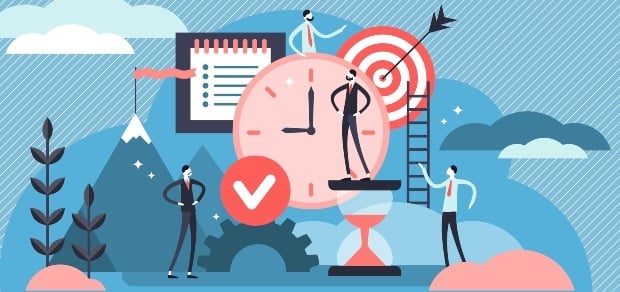
Do you ever feel like your to-do list never gets checked off, but if you had just a couple more hours in each day and one less meeting, you’d be more productive? That better time management would enable you to finally leave work on Friday with a clean slate and the energy to take on Monday?
Turns out, this fantasy of becoming an uber-productive person in your “extra time” might actually be doing your psyche more harm than good, leaving you feeling more stressed and under-accomplished.
Although making the most of our lives is a worthy goal, trying to be productive all the time is incompatible with human nature. A recent The Upside article by Homaira Kabir, a positive psychology coach, explores why managing your energy rather than time is the key to sustainable productivity.
Kabir points out that it’s normal (and healthy) to experience bursts of both productivity and procrastination. This allows our bodies to recover—physically, mentally, and emotionally—so we can be at our peak performance during the next wave of productivity. When we try to defy this cycle, productivity declines, motivation wanes, and we fall behind.
Instead of fruitlessly trying to "find more time,” we should focus on learning how to manage our energy instead. Citing performance psychologist Jim Loehr's book The Power of Full Engagement, Kabir recaps the four sources of energy that impact productivity:
Physical Energy
When energy levels are high, we're up to three times more likely to be productively engaged in our work. And yet, most of us engage in energy-draining habits like sitting too long at our desks and binging TV shows instead of going to bed at a decent time. Establishing better daily habits, like short walks and healthy snacks, to maintain a steady level of physical energy can make a world of difference and make you less reliant on the "high" of sugar or caffeine to get you through the day.
Emotional Energy
We spend a lot of time in our heads rehashing old events or worrying about the future. Research shows that while a wandering mind may help with creative problem solving, it also can make us unhappy and significantly lower performance because stress and regrets drain our energy. Instead, work on turning off that negative inner voice and gently remind yourself of things that have gone well, like the project deadline you met or the successful presentation you gave.
Mental Energy
A study done by Microsoft in 2015 showed that our attention span has declined over time and is now at eight seconds, one second shorter than that of the goldfish. Technology may have made us better at multitasking, but it has also negatively impacted our ability to focus deeply on one task at a time. So it's critical to find times to unplug from digital distractions, stop scrolling, and just focus on the project at hand to preserve precious mental energy.
Spiritual Energy
Because it's arguably the least understood and most subjective to harness, spiritual energy tends to be the most underutilized. Spiritual energy is exactly what it sounds like: energy derived from whatever feeds your soul. It could come from a religious practice, a good book, quiet meditation, a nature walk, playing with a child or pet, or cultivated through a creative pursuit, like art, dance, or music. Studies have shown that when productivity begins to decline, nourishing our spiritual energy can improve cognition. Einstein allegedly played the violin whenever he faced a seemingly impossible problem and supposedly could solve it by the end of the piece.
So the next time you catch yourself trying to manage your time so you can tick off items on your to-do list, stop and do an energy check-in. It might not be lack of time that is the problem.
Read the full article here for practical applications to applying this mindset to your daily life.
